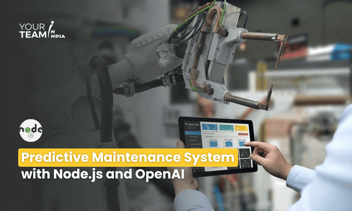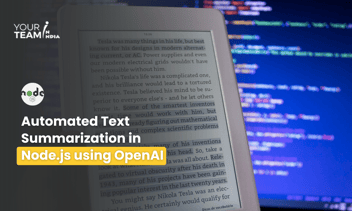Quick Summary: Embark on a journey to empower your financial management with a Personal Finance Assistant built using Node.js and OpenAI. Discover how this dynamic duo can revolutionize your approach to budgeting, spending analysis, and financial insights, putting you in control of your fiscal well-being.
Introduction
In an era where managing personal finances is both complex and crucial, the integration of technology has become essential. This article explores the creation of a Personal Finance Assistant, combining the versatility of Node.js and the intelligence of OpenAI. The goal is to give users a dynamic and insightful tool for making informed financial decisions.
Understanding the Personal Finance Assistant
A Personal Finance Assistant serves as a virtual companion for users, helping them track expenses, set budgets, analyze spending patterns, and make informed financial decisions. By incorporating OpenAI's capabilities, the assistant gains the ability to provide personalized insights and recommendations based on the user's financial data.
Choosing the Right Technology Stack
Node.js, known for its speed and scalability, is an excellent choice for developing the backend of the Personal Finance Assistant. Paired with OpenAI's API, it enables the integration of natural language processing and machine learning to enhance the user experience.
Technical Implementation
1. Setting Up the Node.js Project:
Begin by initializing a new Node.js project and installing essential dependencies, such as Express for building the server.
2. User Authentication and Data Security:
Implement user authentication to secure financial data. Node.js frameworks like Passport.js can simplify this process, ensuring that sensitive information is protected.
3. Connecting to OpenAI API:
Utilize the OpenAI API to integrate natural language processing capabilities into the assistant. This allows the assistant to understand user queries and provide meaningful responses.
4. Expense Tracking and Budgeting:
Implement features for users to input and track their expenses. Node.js can handle the backend logic, storing and retrieving data from a database.
5. AI-driven Financial Insights:
Leverage OpenAI's capabilities to analyze financial data and provide personalized insights. For instance, the assistant can generate summaries of spending patterns or offer recommendations for optimizing budgets.
Testing and Deployment
Write comprehensive tests for different components of your application to ensure reliability. Deploy the Personal Finance Assistant using tools like Docker for containerization and continuous integration for seamless updates.
Conclusion
Building a Personal Finance Assistant with Node.js and OpenAI empowers users to take control of their financial well-being. The seamless integration of Node.js allows for a robust backend, while OpenAI's capabilities enhance the assistant's intelligence, providing users with personalized insights and recommendations. As we continue to embrace technology in personal finance, this dynamic combination sets the stage for a more informed and financially secure future.
Looking to build a Node.js application that can break down language barriers and connect with a global audience? Hire Node.js developers from Your Team in India, and let us take it forward.









